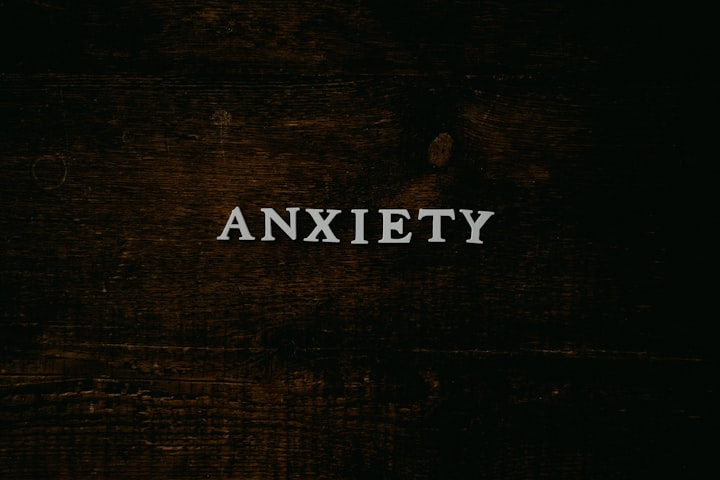5 Self-Care Practices to Reduce Stress and Anxiety
5 best practices to kill Anxiety !

Introduction:
In today's fast-paced world, stress and anxiety are common problems that can have a significant impact on our physical and mental health. While there are many strategies for managing stress and anxiety, one effective approach is self-care. By taking care of ourselves physically, mentally, and emotionally, we can reduce stress, improve our mood, and enhance our overall well-being. In this article, we'll explore five self-care practices that can help reduce stress and anxiety. From mindfulness and meditation to creative expression and hobbies, these practices are simple yet effective ways to prioritize your well-being and manage stress and anxiety in your daily life. By incorporating these practices into your routine, you can take an important step toward a happier, healthier life.
Practice 1: Mindfulness and Meditation
Mindfulness and meditation are powerful tools for reducing stress and anxiety. Mindfulness is the practice of being present in the moment, without judgment or distraction. Meditation is a technique for focusing the mind and calming the body, often through deep breathing or visualization.
Benefits of mindfulness and meditation for reducing stress and anxiety:
- Improved focus and concentration: By training your mind to focus on the present moment, you can increase your ability to concentrate and reduce distracting thoughts.
- Reduced physiological responses to stress: Mindfulness and meditation have been shown to reduce the body's physiological responses to stress, such as increased heart rate and blood pressure.
- Greater self-awareness: By cultivating mindfulness, you can develop a greater awareness of your thoughts, emotions, and physical sensations, which can help you better manage stress and anxiety.
Tips for incorporating mindfulness and meditation into your daily routine:
- Start small: Begin with just a few minutes of mindfulness or meditation per day and gradually increase the time as you become more comfortable with the practice.
- Find a quiet and comfortable space: Choose a quiet and comfortable space where you can focus and relax without distractions.
- Experiment with different techniques: There are many different types of mindfulness and meditation techniques, so experiment with different ones to find what works best for you.
- Practice regularly: Consistency is key, so aim to practice mindfulness and meditation on a daily basis to experience the benefits.
By incorporating mindfulness and meditation into your daily routine, you can develop a greater sense of peace and well-being, and reduce stress and anxiety in your life.
Practice 2: Exercise and Movement
Regular exercise and movement can have significant benefits for reducing stress and anxiety. Exercise helps to release endorphins, the body's natural mood-boosting chemicals, which can improve your mood and help you feel more relaxed.
Benefits of exercise and movement for reducing stress and anxiety:
- Increased endorphins: Exercise helps to increase the release of endorphins, which can improve your mood and help you feel more relaxed.
- Reduced muscle tension: Stress and anxiety can cause muscle tension, but exercise can help to release that tension and promote relaxation.
- Improved sleep: Exercise can help you fall asleep more easily and get more restful sleep, which can reduce stress and anxiety.
Tips for incorporating exercise and movement into your daily routine:
- Choose activities you enjoy: The most effective exercise is one that you enjoy and look forward to, so choose activities that you like, such as dancing, hiking, or playing sports.
- Start small: Begin with short and simple exercises, such as walking or stretching, and gradually increase the intensity and duration as you become more comfortable.
- Set goals and track your progress: Set achievable goals and track your progress to help keep you motivated and accountable.
- Make it a habit: Aim to exercise on a regular basis, ideally every day or at least several times a week, to experience the benefits.
By incorporating exercise and movement into your daily routine, you can improve your physical and mental well-being, reduce stress and anxiety, and boost your overall mood and energy levels.
Practice 3: Healthy Eating Habits
Healthy eating habits can play a significant role in reducing stress and anxiety. What you eat can impact your mood, energy levels, and overall well-being. Eating a balanced and nutritious diet can help support your body and mind, and promote a greater sense of well-being.
Benefits of healthy eating habits for reducing stress and anxiety:
- Improved energy levels: Eating a balanced and nutritious diet can help support your energy levels and reduce fatigue, which can help you better manage stress and anxiety.
- Reduced inflammation: Certain foods, such as those high in sugar and saturated fat, can contribute to inflammation in the body, which can increase stress and anxiety.
- Greater mental clarity: Eating a balanced and nutritious diet can help improve mental clarity and reduce brain fog, which can help you better manage stress and anxiety.
Tips for incorporating healthy eating habits into your daily routine:
- Eat a balanced and varied diet: Aim to eat a variety of whole foods, such as fruits, vegetables, whole grains, lean proteins, and healthy fats, to ensure you're getting all the nutrients you need.
- Avoid processed and sugary foods: Processed and sugary foods can contribute to inflammation and mood swings, so aim to limit your intake of these foods.
- Practice mindful eating: Pay attention to your hunger and fullness cues, and eat slowly and mindfully to better appreciate your food and promote digestion.
- Stay hydrated: Drinking enough water can help support your energy levels and promote healthy digestion, which can also help reduce stress and anxiety.
By incorporating healthy eating habits into your daily routine, you can improve your physical and mental well-being, reduce stress and anxiety, and boost your overall mood and energy levels.
Practice 4: Quality Sleep
Getting enough quality sleep is essential for reducing stress and anxiety. When we sleep, our body and mind have a chance to rest, restore, and recharge. Poor sleep can increase feelings of stress and anxiety, while getting enough quality sleep can have significant benefits for our mental and physical well-being.
Benefits of quality sleep for reducing stress and anxiety:
- Reduced cortisol levels: Cortisol is a stress hormone that can increase when we're sleep-deprived, but getting enough quality sleep can help reduce cortisol levels.
- Improved mood and mental health: Getting enough quality sleep can help improve mood, reduce irritability, and promote better mental health.
- Increased resilience to stress: When we're well-rested, we're better able to handle stress and anxiety, and more resilient to the effects of stress.
Tips for improving sleep quality and reducing stress and anxiety:
- Create a sleep-conducive environment: Keep your bedroom dark, cool, and quiet, and avoid screens and other stimulating activities before bed.
- Establish a consistent sleep schedule: Go to bed and wake up at the same time each day, even on weekends, to help regulate your body's internal clock.
- Practice relaxation techniques: Try relaxation techniques such as deep breathing, meditation, or gentle stretching before bed to help promote relaxation and reduce stress and anxiety.
- Avoid caffeine, alcohol, and heavy meals before bed: Caffeine and alcohol can disrupt sleep, and heavy meals can interfere with digestion and promote wakefulness.
By prioritizing quality sleep and implementing healthy sleep habits, you can improve your physical and mental well-being, reduce stress and anxiety, and promote a greater sense of overall well-being.
Practice 5: Creative Expression and Hobbies
Practice 5: Creative Expression and Hobbies
Engaging in creative expression and hobbies can be a powerful tool for reducing stress and anxiety. Creative activities, such as painting, writing, or playing music, can help promote relaxation, reduce negative thoughts and feelings, and promote a sense of well-being.
Benefits of creative expression and hobbies for reducing stress and anxiety:
- Promotes relaxation: Creative activities can help promote relaxation and reduce feelings of stress and anxiety.
- Increases mindfulness: Engaging in creative activities can promote mindfulness and help you stay present in the moment, which can help reduce anxiety.
- Fosters self-expression: Creative activities can provide a safe and healthy outlet for self-expression and promote a sense of control and agency.
Tips for incorporating creative expression and hobbies into your daily routine:
- Choose activities you enjoy: Choose creative activities that you enjoy and find fulfilling, such as painting, writing, playing music, or gardening.
- Make time for creative activities: Set aside time in your schedule for creative activities and make them a priority, even if it's just a few minutes each day.
- Avoid judgment: Engage in creative activities without judgment or expectations, and focus on the process rather than the outcome.
- Try new things: Experiment with new creative activities or hobbies to challenge yourself and promote new skills and interests.
By incorporating creative expression and hobbies into your daily routine, you can improve your physical and mental well-being, reduce stress and anxiety, and promote a greater sense of overall well-being.
Conclusion
In conclusion, stress and anxiety can have a significant impact on our physical and mental well-being, but by incorporating self-care practices into our daily routines, we can reduce stress and promote a greater sense of well-being. The five self-care practices discussed in this article, including mindfulness and meditation, exercise and movement, healthy eating habits, quality sleep, and creative expression and hobbies, are effective ways to reduce stress and anxiety and promote a greater sense of overall well-being. By prioritizing self-care, we can improve our physical and mental health, reduce stress and anxiety, and live a more fulfilling and joyful life. Remember, taking care of yourself is not selfish, it's necessary for living a healthy and balanced life.
About the Creator
Rehmat Well-being
Transform your life with us! we empower you with health tips, mindfulness practices, and a holistic approach to a happier life. Nourish your mind, body, and soul and live your best life. Join the journey to radiant health and joyous living!






Comments
There are no comments for this story
Be the first to respond and start the conversation.